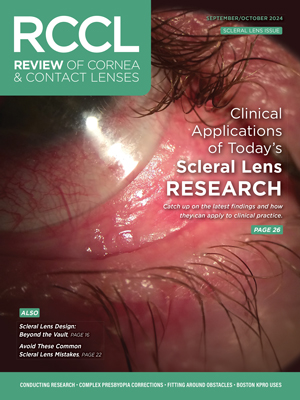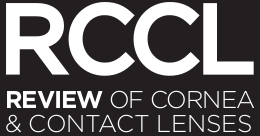• With the acquisition of the ophthalmic division of Berlin-based SensoMotoric Instruments, Alcon now has new ocular surgical guidance technology to add to its global cataract portfolio. This includes real-time eye tracking, automatic registration of ocular imaging, and intraocular lens positioning and guidance alignment. For more information, visit www.alcon.com.
• What inspires you? “Inspiring for the Future” is the theme for this year’s 37th British Contact Lens Association (BCLA) Clinical Conference and Exhibition, and the organization hopes to inspire all its delegates in contact lens practice, research and business. The conference, to be held June 6-9, 2013, will feature the 2013 BCLA Medal honoree Judith Morris, BSc (Hons), MSc; the Irving Fatt Memorial Lecture from Mitra Tavakoli, BScOptom (Hons), MSc, PhD, research fellow at the Centre for Endocrinology & Diabetes at the University of Manchester; and keynote speeches from Florence Malet, MD, director of the French University Educational Diploma of Contactology, Eric Papas, PhD, director of studies at Vision Cooperative Research Centre in Australia and Brian Tighe, PhD, DSc, professor of polymer science at the University of Birmingham. For more information, visit www.bcla.org.uk.
• CooperVision and the Armed Forces Optometric Society are partnering to launch a new website to better serve US military communities. Still in the planning stages, this new collaboration will allow military personnel and families to purchase CooperVision contact lenses affordably and be guaranteed delivery wherever they are located in the world. For more information, visit
www.afos2020.org.
A Complete Lens Display
Have you even imagined being able to look up directions without having to take out your phone? Or reading a text directly from your lenses? Well, the technology is not quite there yet, but researchers are making big strides.
Belgian researchers have unveiled a new spherical, curved liquid crystal display (LCD) that can be embedded in contact lenses—the first step toward a fully pixelated contact lens display. Unlike LED technology, which is limited to a few pixels, LCD can use the entire surface of the lens. This could convert a contact lens into adaptive sunglasses or a display. This technology could also be used for cosmetic purposes or in medical applications, such as to control light transmission toward the retina in damaged irises.
“The main challenge was to create a very thin, spherically curved substrate with active layers that could withstand the extreme molding processes,” Jelle De Smet, head researcher for the project, said in a press release. This was accomplished by using new types of conductive polymers that were integrated into a smooth spherical cell.
The technology is currently only capable of creating simple patterns, such as the dollar sign unveiled in the prototype. Since the eye cannot focus on anything that is in that close a range, the display would only be visible to others—for now. Future applications of this technology have been compared to Google’s Project Glass, minus the headgear.
An Early Morning Regimen
For patients using 30-day extended wear/continuous wear lenses, a new study advises morning replacement. The data shows that replacing lenses at night is comparable to replacing lenses monthly, but replacing lenses every morning reduces the overall rate of ocular adverse events.
The study evaluated 215 patients using silicone hydrogel EW/CW lenses; the lenses were designed for overnight wear, but the patients put in fresh lenses every day (either at night before going to bed, or in the morning after waking). Patients were evaluated at regular clinic visits and the adverse events were compared between those who replaced lenses at night or in the morning vs. a previously studied group who wore the lenses continuously for a month.
Results showed a 4% adverse event rate for patients who replaced lenses in the morning and an 8% rate for those who replaced lenses at night vs. a 9% rate for the monthly wear patients. Furthermore, morning lens replacement was associated with a 1% rate of mechanical adverse events (i.e., scratches and abrasions of the cornea) vs. a little more than 5% with monthly replacement.
Researchers concluded that replacing lenses at night does not have a beneficial effect, perhaps due to the side effects of handling lenses just prior to overnight eye closure. The complete study was published in the December issue of Optometry and Vision Science.


